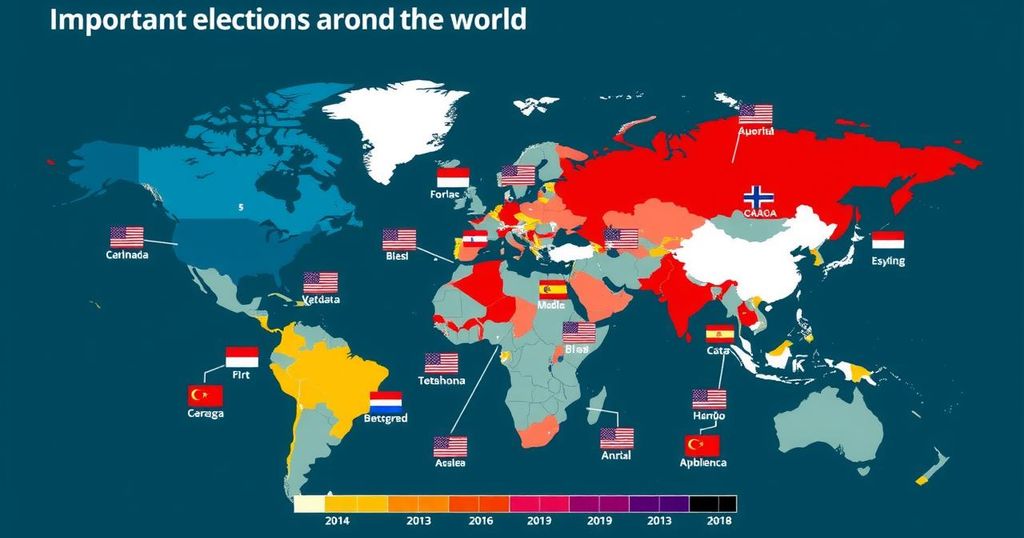Global 2024 Elections: A Retrospective on Significant Political Shifts

The 2024 elections yielded pivotal changes globally, highlighting significant political shifts in the US, India, and Mexico, among others. Trump’s return could recalibrate US and global politics, while Modi’s party lost its majority for the first time. In Mexico, Claudia Sheinbaum made history as the first female president, defying trends of declining incumbency. South Africa’s elections resulted in coalition governance, revealing widespread dissatisfaction with long-standing leadership. Other countries, including Pakistan and the UK, face emerging political challenges as the ramifications from these elections unfold.
As we conclude the cycle of significant elections in 2024, it is evident that various pivotal moments have unfolded globally. The following elections illustrate substantial shifts in political landscapes across nations, including the United States, India, and Mexico, amongst others, where over one billion individuals engaged in the democratic process. Each listed election bears profound implications for not only the respective nations but also for the international political arena.
1. In the United States, Donald Trump’s anticipated return to the presidency marks a transformation in both domestic and global politics. His administration is predicted to challenge longstanding institutions and potentially reshape the fundamental tenets of American democracy. The true impact of a Trump presidency will rest on his interactions with Congress, which is currently marked by a thin margin.
2. India witnessed an unexpected outcome in its elections as incumbent Prime Minister Narendra Modi’s Bharatiya Janata Party (BJP) fell short of a parliamentary majority for the first time. This shift has prompted Modi to cultivate alliances with partner parties, raising questions about the BJP’s future dominance and potentially opening avenues for a more robust opposition.
3. In a striking deviation from global trends, Mexico’s elections produced a historic outcome with the election of Claudia Sheinbaum, the first female president from President Andrés Manuel López Obrador’s Morena party. Sheinbaum’s victory, securing greater support than her predecessor, suggests a resilient governing reputation amidst a global incumbency crisis.
4. South Africa’s political landscape experienced a seismic shift as the African National Congress (ANC) lost its majority, resulting in a coalition government formed through negotiations with various opposition parties. This restructuring marks a new chapter in South African politics, reflecting dissatisfaction with the ruling party’s prolonged governance.
5. The Japanese Liberal Democratic Party encountered its third loss of majority status, echoing political changes occurring within its framework. Yet, despite electoral challenges, the party maintains a significant foothold, reflecting a preference among voters for continuity.
6. Political turbulence continues in Pakistan following an election marred by allegations of manipulation. Although Imran Khan remains imprisoned, his party has demonstrated resilience, advocating for his release and seeking to reclaim its political footing amid widespread discontent regarding the election’s integrity.
7. The United Kingdom’s Labour Party celebrated substantial gains in the recent election. However, it faces emerging challenges as incumbent backlash begins to unravel its initial momentum, signaling a potential resurgence of the Conservative Party and further political instability.
8. In France, an unexpected snap election led to a fragmented outcome, with President Macron seeking to leverage opposition disarray. Nevertheless, reliance on the far-right party’s support complicates governance and reflects the fragmented state of French politics.
9. Senegal’s recent elections underscore a growing trend of decolonial politics in Africa, with President Bassirou Diomaye Faye aiming to address historical injustices through new policies. He has received a clear mandate to further this agenda, resonating with a wider movement across the continent opposing colonial legacies.
Notably, the upcoming presidential election in Romania could significantly impact the European Union, featuring a competitive match-up between a center-right reformist and a far-right candidate labeled as a pro-Russian entity.
The 2024 elections have spotlighted a series of significant political transformations across the globe. With more than one billion voters participating, the results have not only reshaped the political dynamics within the countries involved but have also had profound implications on regional and global scales. Understanding these elections is crucial in recognizing the evolving political atmosphere and the potential ramifications for nations and international relationships.
In conclusion, the elections of 2024 have showcased critical shifts in global politics, as countries like the United States, India, and Mexico navigate new political landscapes. Amidst ongoing challenges and unexpected electoral outcomes, the respective leaders and parties must forge new paths to governance while responding to the demands and sentiments of their citizens. The ripple effects of these elections will continue to shape domestic and international affairs in the years to come.
Original Source: www.semafor.com








